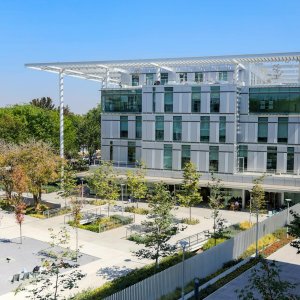The Great Opportunity for the Green Restart

STORY INLINE POST
The COVID-19 pandemic will undoubtedly be marked in history. Its impact has been witnessed across sectors.
Even though the retail and hospitality industry did not stop, the most recent analyses estimate that production and economic activity fell between 30 and 40 percent during the highest peak. In the commercial sector’s HORECA segment (hotels, restaurants and catering), it is estimated that during the pandemic, hotel occupancy reached just 50 to 60 percent and led to the closure of some units. We know that the ability to operate with competitive costs even at 60 percent utilization can be the difference in maintaining a business over the long run.
The building construction sector is another of the industries that experienced negative effects. Although a restructuring is expected due to changes in habits among professionals, such as remote and co-working, the sector is expected to grow in the medium term. But buildings can account for up to a third of energy use. It is a priority to take advantage of this restructuring with a transformation that allows greater operational efficiency. This is even more vital if we consider that across the world, the equivalent of an entire New York City will be built every month for the next 40 years. Each new square meter emits greenhouse gasses when heated, cooled, or filled with appliances and equipment.
The industrial sector was also affected in different ways depending on the industry; however, it presents enormous opportunities to improve resilience, flexibility, energy savings and a reduced carbon footprint. It is estimated that the industrial sector is responsible for 20 percent of the total greenhouse gas emissions in the world.
Globally, governments are looking to reopen society with recovery packages focused on economic development and job creation. We must take advantage of this context to look for ways to restart efficiently. How can we sustainably transform industries?
To support this post-pandemic reengineering, Danfoss proposes the Green Restart initiative. This refers to a restart of activities that are efficient and also friendly to the environment. This initiative suggests that after the current conjuncture we have the opportunity to return to even higher activity levels than before the pandemic, but with more efficient and modular operations that adapt to the capacity cycles of the business.
To reach the Paris Agreement goal of keeping global warming to 1.5 degrees Celsius, we need to rethink production processes to optimize our energy resources, such as the use of intelligent frequency converters to perfect the speeds of electric motors in order to reduce their energy consumption, as well as digital solutions that increase uptime by predicting maintenance needs.
Manufacturing plants can also be equipped with intelligent systems that allow energy to be recovered and reused and, in some industries, to share the excess with local communities through integrated systems, increasing energy flexibility and maximizing the use of renewable resources while minimizing emissions.
Solutions like these will make our industries more sustainable and competitive, regenerate lost jobs and jointly become a green reset.
Kim Fausing, CEO of Danfoss, is convinced that the economic reset after COVID-19 has to be ecological and sustainable. "In the industry, we have the solutions and the commitment to address climate change. We must invest and focus on reducing emissions through energy efficiency in buildings, in industry and by electrifying our means of transport."
Through the Green Restart initiative at Danfoss, we want to publicize the alternatives that are available to help various industries and businesses find ways to improve their processes by adapting operating costs to the different capacity demands of their business.
Solutions such as the electronic expansion valve and variable speed compressors can help the HORECA sector achieve operational savings of up to 30 percent. Intelligent monitoring systems allow operations to adapt to the occupancy and usage levels of each business unit.
In buildings, through the use of individual temperature control or with technologies such as variable speed drives or magnetic levitation compressors, air conditioning operates with energy savings of 50 percent in addition to adapting the equipment to the operation of the building, improving operating costs.
To reduce emissions in industry, the operations of factories must be increased efficiently. The current context creates an opportunity to redesign our industries to build resilience and boost competitiveness, while reducing emissions and paving the way to a carbon-neutral future. Up to 8 percent of global energy savings can be achieved by 2040 if all industrial motors are operated with variable speed drives, and it is possible to achieve savings of 40 percent if we optimize energy through intelligent control and automation devices.
Those industries better known as "Industry 4.0" for their mature digitalization implementation strategies reported greater responsiveness to the COVID-19 crisis. Technologies, such as artificial intelligence, IoT (Internet of Things) in both domestic and industrial HVAC devices and big data, present opportunities to optimize and take advantage of current equipment to achieve maximum efficiency without incurring high replacement costs.
As part of our commitment at Danfoss, we have embarked on an ambitious journey to become completely CO2 neutral by 2030 at the latest. Since 2007, Danfoss has lowered its energy intensity by 45 percent and CO2 emissions by 36 percent, driven mainly by energy-saving projects in our factories around the world. As of 2021, a significant part of Danfoss' global electricity consumption is being covered by wind energy. Our manufacturing plant in Mexico has been operating since last year with 15 percent energy savings, in addition to the 20 percent savings seen in 2020.
As a company, we are clear that we need to turn to sustainable solutions and make energy saving a strategic priority for our businesses. The Green Restart initiative is a Sustainable Competitive Advantage that allows us to face the future of business in a flexible and adaptable way.
Xavier Casas is the Managing Director of Danfoss Mexico. He has developed his entire professional career within the company and in the last two years, he was the global head of the supply chain of the Commercial Refrigeration and Air Conditioning area, being at the forefront of the strategy in the operations in the Danfoss factories located in India, China, Poland and Denmark, aiming to increase flexibility and business agility to meet the needs of customers.
























